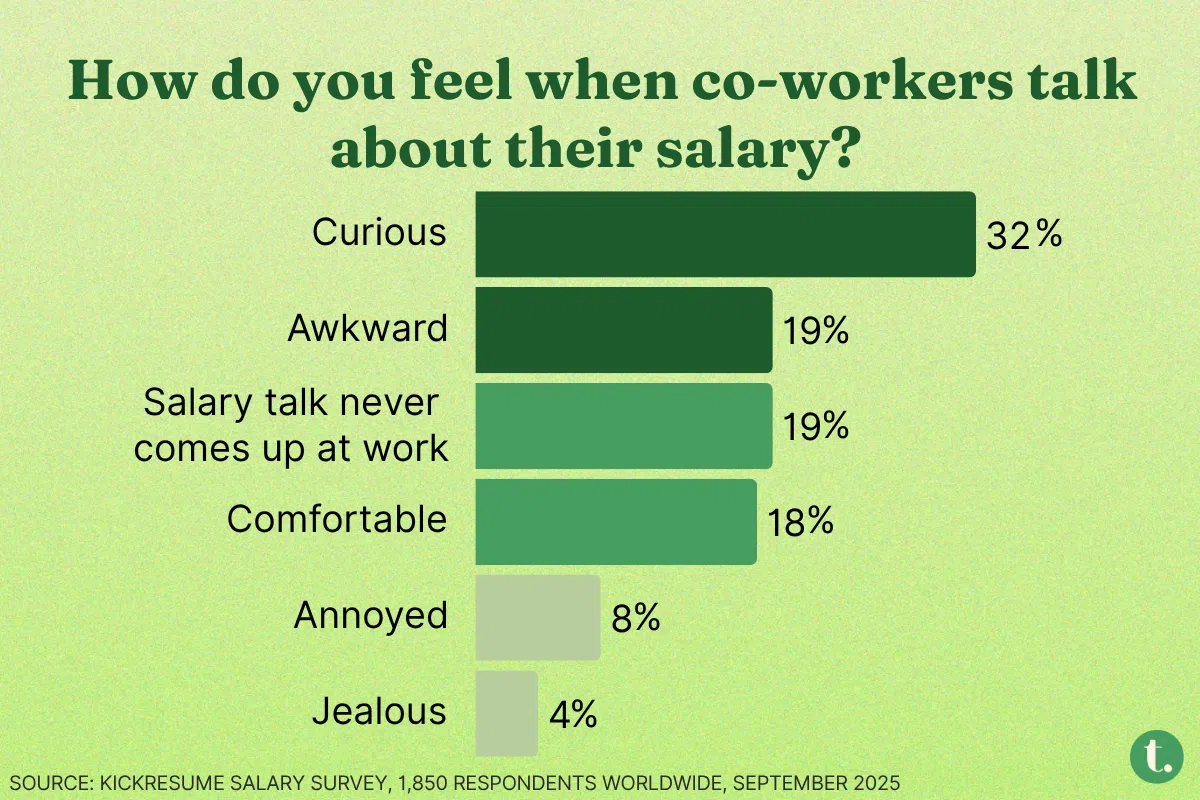Is salary talk still taboo? Your younger colleagues may not think so.

Straight to your inbox. Money, career and life hacks to help young adults stay ahead.
[SINGAPORE] Earlier this week, I asked my colleagues: “Do you guys talk about pay here? How about at your previous workplace?”
One colleague said he’d rather avoid the topic to prevent hurting anyone’s feelings.
Meanwhile, my Gen Z co-workers shared that they’ve openly discussed salaries at their previous jobs and some didn’t find it awkward at all.
While the mention of pay may make us flinch, younger employees are rewriting the rules of salary talk at work.
Survey findings by Kickresume show that globally, nearly 40 per cent of Gen Zs openly discuss salaries with their co-workers – more than millennials (30 per cent) and Gen X (22 per cent).
And younger workers aren’t just talking about pay when it’s permitted. According to the survey, 18 per cent of Gen Zs have conversations about salaries even when it isn’t technically allowed at work.
Navigate Asia in
a new global order
Get the insights delivered to your inbox.
But where one may assume that conversations about pay may build tension between colleagues, across generations, curiosity was the common reaction when co-workers reveal their salaries, the survey found.
Among Gen Zs, the majority (38 per cent) also say they are genuinely interested in salary talk.

🤑 Lunch with a side of salary talk
A friend recently humoured me with a story. He and his colleague hold the same role, but he noticed that his colleague often orders an extra chicken chop for lunch while he sticks to budget meals.
He chalked it up to appetite, until salary came up in a conversation one day.
“Those extra few hundreds my colleague earns? Ah, that’s how he’s able to afford two mains,” he says.
I asked if he had to tiptoe around pay-related conversations at work. With older colleagues it still feels awkward, my friend admits.
But with colleagues of similar age, they are happy to share their salaries openly and treat it like a casual exchange of information rather than a contest of who earns more, he says.
That said, not everyone is as open. My colleague notes that she prefers giving a salary range over revealing her exact pay amount.
Being guarded about how much we earn is understandable, as money often feels like it is tied to our self-worth.
Especially in Asian cultures, where we are taught that success is measured by how much we make. So, when we’re asked about our pay, what we tend to hear is: How much are you worth?
But speaking to Gen Z professionals around me, it is comforting to know that many of us are slowly detaching our identity from our earnings – which is also partly why talking about pay feels less taboo these days.
Our push for openness isn’t entirely surprising to me. Growing up in uncertain times, it makes sense that our generation values clarity and transparency, especially when it comes to something as important as our pay.

🤝 Push toward pay transparency
Even so, pay secrecy, whether explicitly stated or looming as an unspoken rule, still exists in the workplace.
In Singapore, there are no pay transparency laws and many employees hesitate to talk about how much they earn with their co-workers for fear of rocking the boat.
According to a report by Michael Page, over half (54 per cent) of Singaporeans say salary structure in their organisation isn’t transparent, and 66 per cent support the introduction of government legislation to make salaries transparent.
Globally, standards for pay transparency are evolving. For instance, there is the European Union’s 2026 Pay Transparency Directive. But is advocacy for salary transparency in Singapore gaining momentum too?
While pay secrecy has traditionally been the norm in Singapore, Gen Z workers are shaping the push for pay transparency, Maggie You, partner and head of people advisory Asia-Pacific at Aon says.
Gen Zs are more likely to question pay structures, compare salaries with peers and share wages online.
“Pay transparency is crucial in today’s job market, particularly for attracting younger talent,” You says. And because more Gen Zs are entering the workforce, this has pushed companies to become more transparent in their compensation practices, she adds.
Plus, companies that adopt pay transparency also often see higher offer acceptance rates and improved employee engagement scores, she adds.

💬 Initiating conversations about salaries
If your contract doesn’t prohibit it, open discussions about pay can be genuinely helpful.
It gives you a better sense of your “market rate” and fosters a culture of fairness and trust within the workplace.
Open and constructive conversations about pay with our managers can also help employees better understand pay policies and promote a more equitable work environment, You says.
Nonetheless, starting conversations about pay can be tricky. So, here’s how to smoothly initiate salary talk at work:
- If you’re not comfortable bringing it up in a group setting, try having a one-to-one conversation with a trusted colleague instead
- Approach questions about pay with genuine curiosity, not comparison
- When bringing it up in a group setting, be open about how this could benefit everyone
- Keep things objective and focus on the role or salary
- Always be respectful of boundaries
But if you’d like to skip conversations about pay entirely, there are various salary benchmark tools such as the Ministry of Manpower’s Salary Comparison page or annual salary guides published by private recruitment firms.
TL;DR
- Gen Z workers are more open and comfortable discussing salaries with their co-workers
- As more younger workers enter the workforce, the push for pay transparency may be growing
- Still, discussions about pay with our co-workers should be approached professionally to avoid misunderstandings
Decoding Asia newsletter: your guide to navigating Asia in a new global order. Sign up here to get Decoding Asia newsletter. Delivered to your inbox. Free.
Copyright SPH Media. All rights reserved.


